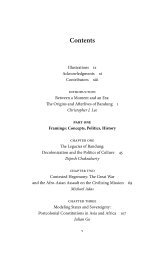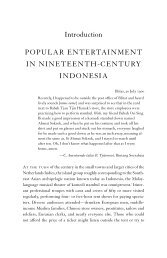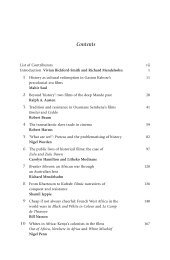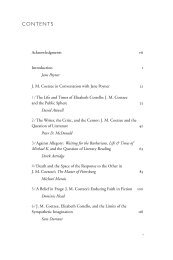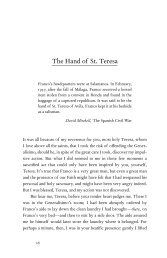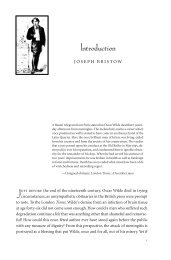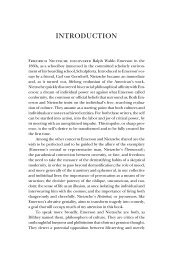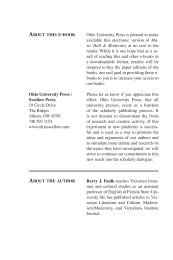Race, Revolution, and the Struggle for Human Rights in Zanzibar ...
Race, Revolution, and the Struggle for Human Rights in Zanzibar ...
Race, Revolution, and the Struggle for Human Rights in Zanzibar ...
Create successful ePaper yourself
Turn your PDF publications into a flip-book with our unique Google optimized e-Paper software.
tent on <strong>in</strong>fluenc<strong>in</strong>g a ris<strong>in</strong>g generation of nationalists. In do<strong>in</strong>g so, he<br />
<strong>and</strong> a few o<strong>the</strong>rs literally put <strong>Zanzibar</strong> on <strong>the</strong> socialist map of <strong>the</strong> world.<br />
In <strong>the</strong>ir time abroad, <strong>Zanzibar</strong>is reflected on isl<strong>and</strong> history <strong>and</strong> came to<br />
believe <strong>the</strong>y understood its essential <strong>in</strong>justices, contradictions, <strong>and</strong> medievalisms.<br />
They learned to regard <strong>the</strong>mselves as a cosmopolitan elite<br />
with access to a ready-made template to erase all <strong>the</strong> ills of isl<strong>and</strong> society.<br />
They adopted a general historical sense that socialism had <strong>and</strong> would<br />
cont<strong>in</strong>ue to be adopted by <strong>the</strong> planet’s most progressive nations. They<br />
began <strong>the</strong>ir analysis of isl<strong>and</strong> history not from <strong>the</strong> moment Arabs first<br />
civilized or enslaved Africans, but from an imag<strong>in</strong>ary future when<br />
<strong>Zanzibar</strong> would fully realize its capacities <strong>for</strong> development. They sought<br />
to conv<strong>in</strong>ce o<strong>the</strong>rs that <strong>Zanzibar</strong> could become someth<strong>in</strong>g completely<br />
different <strong>and</strong> better by radically depart<strong>in</strong>g from centuries of its own historical<br />
evolution. Issa <strong>and</strong> his comrades adopted an imported future that<br />
<strong>for</strong>ced <strong>the</strong>ir secession from <strong>the</strong> ZNP <strong>and</strong> compelled <strong>the</strong>ir support <strong>for</strong> a<br />
revolution <strong>the</strong>y sought <strong>and</strong> failed to control.<br />
Issa’s story, <strong>the</strong>n, provides <strong>in</strong>tellectual context to <strong>the</strong> revolution. Issa’s<br />
stated <strong>in</strong>tent is, <strong>in</strong> fact, to suggest that he <strong>and</strong> his comrades were a vanguard<br />
responsible <strong>for</strong> nearly all that was enlightened about <strong>the</strong> revolution<br />
<strong>and</strong> that had <strong>the</strong>y been able to <strong>in</strong>fluence leaders like Karume to genu<strong>in</strong>ely<br />
follow socialism, <strong>the</strong> revolution would have succeeded. In this respect,<br />
Issa echoes his life-long associate, A. M. Babu, who claimed <strong>the</strong> comrades<br />
<strong>in</strong>tervened to broaden “<strong>the</strong> objectives of <strong>the</strong> upris<strong>in</strong>g from a narrow,<br />
lumpen, anti-Arab, anti-privilege, anti-this <strong>and</strong> anti-that perspective<br />
<strong>in</strong>to a serious social revolution with far-reach<strong>in</strong>g political, social <strong>and</strong><br />
economic objectives.” 23 Given time <strong>and</strong> <strong>in</strong>fluence, <strong>the</strong> comrades could<br />
have fully developed <strong>the</strong> nation’s productive <strong>for</strong>ces. They were thwarted,<br />
however, by “novices” who ruled <strong>the</strong> isl<strong>and</strong>s “with <strong>the</strong> caution of a bull<br />
<strong>in</strong> a ch<strong>in</strong>a shop” <strong>and</strong> who relegated <strong>Zanzibar</strong> to “permanent stagnation.” 24<br />
<strong>Zanzibar</strong>, once “a brilliant revolutionary star of Africa, was hence<strong>for</strong>th to<br />
be reduced to one of <strong>the</strong> worst bungl<strong>in</strong>g <strong>and</strong> tyrannical petty-bourgeois<br />
despotisms <strong>in</strong> Africa.” 25<br />
Issa endorses selected aspects of <strong>the</strong> revolution <strong>and</strong> exonerates himself<br />
from o<strong>the</strong>rs. His narrative is at times a confession, a polemic, <strong>and</strong> a<br />
dispassionate account of revolutionary events. He distances himself from<br />
<strong>the</strong> racial politics espoused by <strong>the</strong> regime he served, yet he helped <strong>in</strong>troduce<br />
socialist purge categories like “capitalists” that served as popular labels<br />
<strong>for</strong> Arabs <strong>and</strong> Asians. As a cab<strong>in</strong>et m<strong>in</strong>ister <strong>for</strong> eight years, Issa en<strong>for</strong>ced<br />
a quota system that ended Asian <strong>and</strong> Arab dom<strong>in</strong>ation of secondary education.<br />
He nationalized Arab <strong>and</strong> Asian properties <strong>in</strong> <strong>Zanzibar</strong> Town<br />
<strong>and</strong> established youth-labor camps <strong>in</strong> <strong>the</strong> countryside. Though one of<br />
Cosmopolitanism <strong>and</strong> Its Discontents 9



